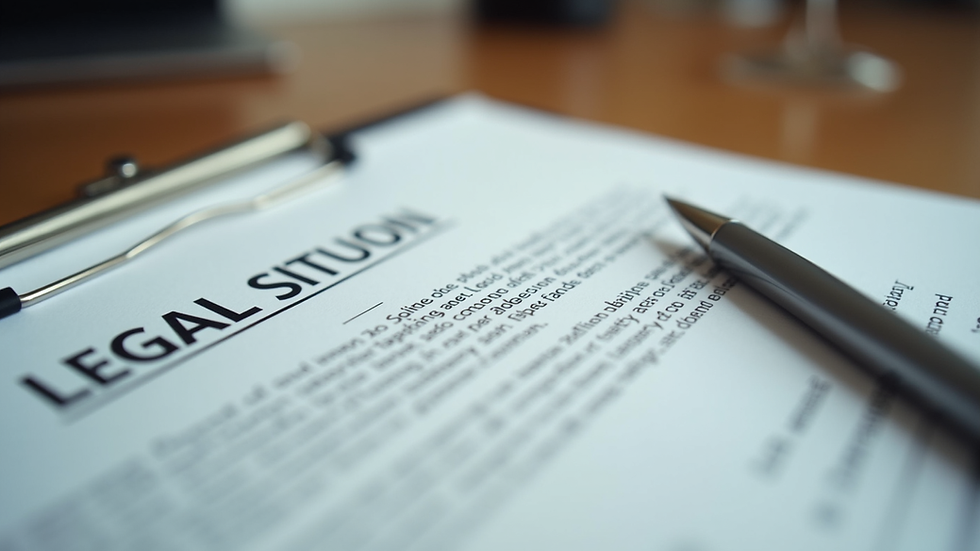Understanding Inheritance Tax in the UK
- Anita Barker
- Sep 29, 2025
- 4 min read
Inheritance tax can be a complex topic for many people in the UK. It involves rules about what happens to your money and property after you pass away. Knowing how these rules work can help you plan better and potentially save money for your loved ones. This article will explain the key points of UK inheritance tax rules, how they apply to different situations, and what you can do to manage your estate effectively.
What Are the UK Inheritance Tax Rules?
Inheritance tax is a tax on the estate of someone who has died. This includes their money, property, and possessions. In the UK, the tax is charged at 40% on the value of the estate above a certain threshold, known as the nil-rate band. As of the current rules, this threshold is £325,000 per person.
If the estate is worth less than this amount, no inheritance tax is due. However, if it exceeds this, the amount above the threshold is taxed. There are also additional allowances, such as the residence nil-rate band, which can increase the threshold if a home is passed to direct descendants.
Key Points of UK Inheritance Tax Rules:
The standard nil-rate band is £325,000.
The residence nil-rate band can add up to £175,000 if a home is passed to children or grandchildren.
Spouses and civil partners can combine their allowances, potentially allowing up to £1 million tax-free.
Gifts made more than seven years before death are usually exempt.
Understanding these rules helps in planning your estate to reduce the tax burden.

How to Reduce Your Inheritance Tax Liability
There are several ways to reduce the amount of inheritance tax your estate might have to pay. Planning ahead is essential, and some methods include:
Gifting During Your Lifetime
You can give away money or assets while you are alive. Gifts made more than seven years before your death are usually exempt from inheritance tax. This is called the "seven-year rule."
Using Trusts
Trusts can help protect assets and reduce tax liability. They allow you to pass on wealth under specific conditions.
Charitable Donations
Leaving part of your estate to charity can reduce the tax rate from 40% to 36%.
Spouse or Civil Partner Transfers
Assets passed to a spouse or civil partner are usually exempt from inheritance tax.
Making Use of Allowances
Combining the nil-rate band and residence nil-rate band can significantly increase the tax-free amount.
It is advisable to seek professional advice to ensure your estate plan is effective and compliant with current laws.

Do You Pay Inheritance Tax If You Inherit Your Parents' House?
Many people wonder if inheriting a family home means they will have to pay inheritance tax. The answer depends on several factors, including the value of the estate and who inherits the property.
If the total value of your parents' estate, including the house, is below the nil-rate band (£325,000) plus any residence nil-rate band, then no inheritance tax will be due. The residence nil-rate band can add up to £175,000 if the home is passed to direct descendants such as children or grandchildren.
However, if the estate is worth more than these combined thresholds, inheritance tax may be payable on the amount above the limit. It is important to note that the tax is charged on the estate as a whole, not just the house.
Example:
Your parents' estate is worth £600,000.
Nil-rate band: £325,000
Residence nil-rate band: £175,000
Total tax-free allowance: £500,000
Taxable amount: £600,000 - £500,000 = £100,000
Tax due at 40% on £100,000 = £40,000
In this case, inheritance tax would be payable on the £100,000 above the allowance.
If you are the beneficiary, you do not pay the tax directly. It is usually paid by the executor of the estate before the assets are distributed.

What Happens If You Do Not Pay Inheritance Tax?
Failing to pay inheritance tax can lead to serious consequences. The tax must be paid before the estate can be fully distributed to beneficiaries. If the tax is not paid on time, HM Revenue and Customs (HMRC) can charge interest and penalties.
In some cases, the estate may need to sell assets, including property, to cover the tax bill. This can delay the inheritance process and reduce the amount beneficiaries receive.
To avoid these issues, it is important to:
File the inheritance tax return promptly.
Pay any tax due within six months of the end of the month in which the person died.
Seek professional advice if you are unsure about the process.
Planning ahead and understanding your obligations can help ensure a smooth transfer of assets.
Planning Ahead for Peace of Mind
Planning your estate is one of the best ways to protect your assets and reduce the impact of inheritance tax. Here are some practical steps you can take:
Write a Will: Clearly state how you want your assets to be distributed.
Consider Life Insurance: A policy can cover potential inheritance tax bills.
Review Your Estate Regularly: Laws and personal circumstances change, so keep your plan up to date.
Consult a Specialist: Estate planning professionals can provide tailored advice.
By taking these steps, you can help ensure your loved ones receive the maximum benefit from your estate.
For more detailed information on inheritance tax, including current thresholds and exemptions, visit the linked resource.
Understanding UK inheritance tax rules can seem daunting, but with the right knowledge and planning, you can manage your estate effectively. Taking action early helps protect your assets and provides peace of mind for you and your family.
%20(750%20%C3%97%20250px)(2).png)



Comments